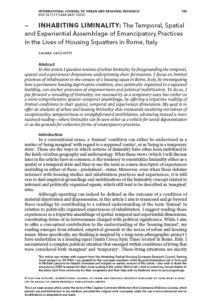International Journal of Urban and Regional Research
Authored by #UnequalCities Network member Chiara Cacciotti
Abstract: In this article I question notions of urban liminality by foregrounding the temporal, spatial and experiential dimensions underpinning their formations. I focus on liminal practices of inhabitation in the context of a housing squat in Rome, Italy, by investigating how a permanent housing deprivation condition, once politically organized in a squatted building, can anchor processes of empowerment and political mobilization. To do so, I put forward a rereading of liminality, not necessarily as a temporary state but rather as more comprehensive spatial–temporal assemblage, by offering a tripartite reading of liminal conditions in their spatial, temporal and experiential dimensions. My goal is to offer an analysis of urban and housing liminality that transcends totalizing narratives of exceptionality, temporariness or straightforward annihilation, advancing instead a more nuanced reading—where liminality can be seen either as a vehicle for social depotentiation or as the grounds for collective forms of emancipatory practices.


